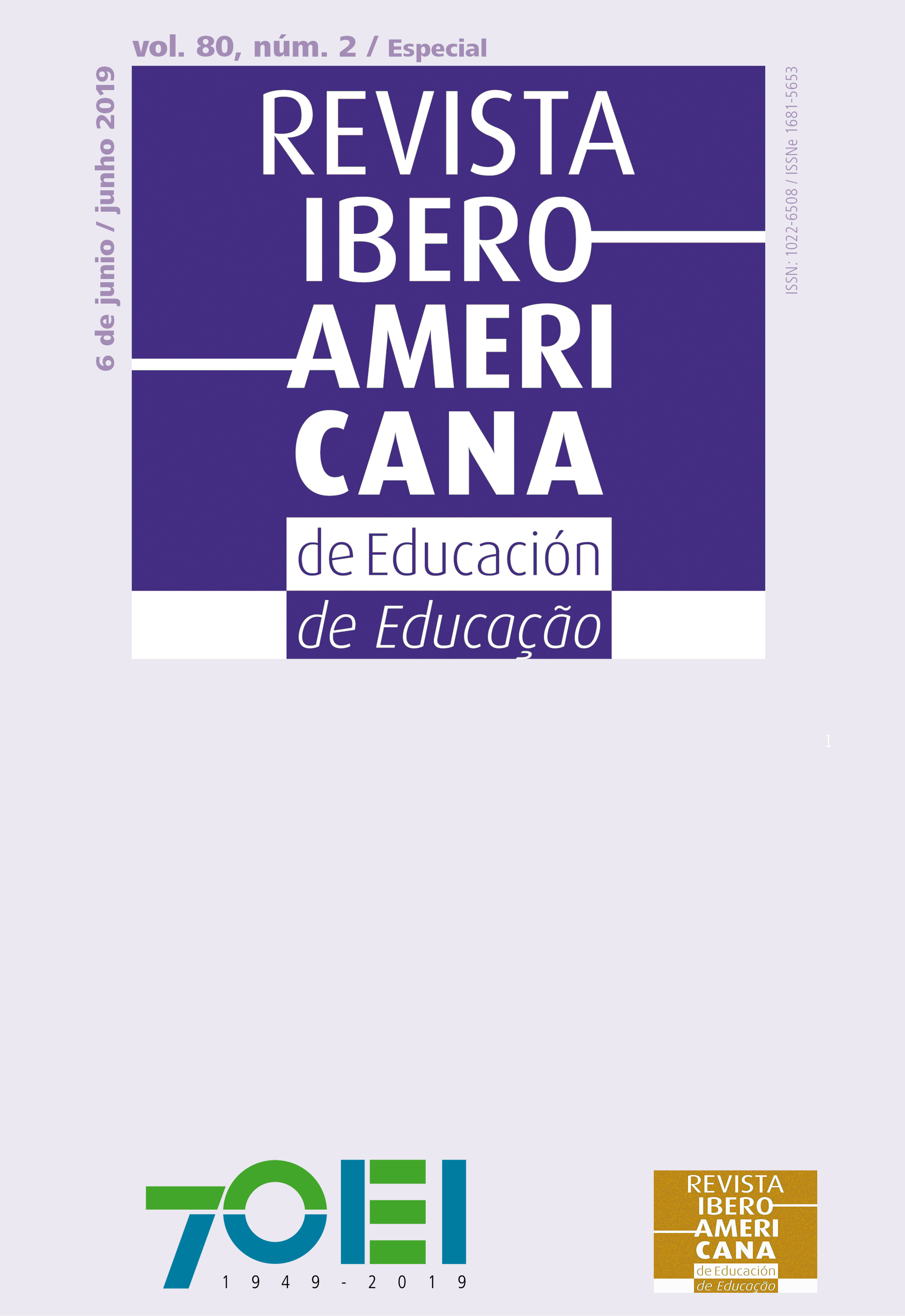The role of aggression and victimization among equals in school failure
DOI:
https://doi.org/10.35362/rie8023202Keywords:
aggression; victimization; scholar failureAbstract
School failure, its causes and the promotion of academic success have been a concern of the Portuguese educational system shared by different political ideologies, which has remained an educational problem priority for several decades. In order to contribute to understanding the causes of school failure and to better promote educational success, data from three investigations are analyzed (one with 572 primary and secondary school students, the other with 15 teachers from the three levels of basic education and another from 186 primary pupils). These researches aims to verify the relationships between the aggressive behaviors between peers, perceived and self-reported by the pupils, and their academic achievement at school, on the one hand, and the teachers' perceptions about the disruptive behaviors of their pupils and academic achievement. Self-report and nominations questionnaires were used in the case of the pupils and the teachers completed a questionnaire for each of their pupils. The data obtained in these questionnaires were related to a school achievement measure (approval / disapproval at the end of the school year). The results suggest a relation between the aggressive behavior of the students and school failure, both in the self and hetero reports of the students, and through the teachers' perception, suggesting that programs to prevent bullying, indiscipline and aggression among peers can contribute to promote school success, and consequently for the inclusion of all students
Downloads
References
aQeduto (2016a). Chumbar melhora as aprendizagens?, Estudo aQeduto Q2, CNE / FFMS, Lisboa. Disponível em https://bit.ly/2WuR6jn
aQeduto (2016b). Bons ambientes, bons alunos?, Estudo aQeduto Q6, CNE / FFMS, Lisboa. Disponível em https://bit.ly/2WuR6jn
aQeduto (2016c).Afinal porque melhoraram os resultados dos alunos portugueses?, Estudo aQeduto Q11, CNE / FFMS, Lisboa. Disponível em https://bit.ly/2WuR6jn
Almeida, L, Gomes, C., Ribeiro, I., Dantas, J. Sampaio, M, Alves, M., ...Santos, F. (2005). Sucesso e insucesso no ensino básico: relevância de variáveis sócio-familiares e escolares em alunos do 5.º ano. In Atas do VIII Congresso Galaico-Português de Psicopedagogia (pp. 3629-3641). Braga: Universidade do Minho
Bilié, V., Flander, G. B., & Rafajac, B. (2014). Life satisfaction and school performance of children exposed to classic and cyber peer bullying. Collegium Antopologicum, 38(1), 21-29.
Carvalho, C., & Convoy, J. (Orgs). (2015). Feedback, identidades, trajetórias escolares: dinâmicas e consequências. E book. Disponível em https://bit.ly/2HO44kh
Diaz-Aguado, M. J. & Arias, R. M. (Dirs.) (1999). Infancia en situación de riesgo social. Un instrumento para su detección a través de la escuela. Madrid: Dirección General de Educación. Dirección General de Investigación da Comunidad de Madrid.
Diaz-Aguado, M. J. (2004) (Dir.). Prevención de la violencia y lucha contra la exclusión desde de la escuela. 3 volúmenes y un vídeo. Madrid: Instituto de la Juventud.
Fernandes, H. Caldeira, S., & Veiga, F. (2014). Envolvimento do aluno na escola e comportamento disruptivo. Revista Ibero-americana de Educação, 66(1), 1-12. Disponível em https://bit.ly/2Xeiwao
Feldman, M., Ojanen, T., Gesten, E., Schrandt, H., Brannick, M., Totura, C. …Bronw, K. (2014). The effects of middle school bullying and victimization on adjustment through high school; growth modeling of achievement, school attendance, and disciplinary trajectories. Psychology in the Schools, 51(10), 1046-1062.
Janoz, M., & Blanc, M. (2000). Abandono escolar na adolescência. Factores comuns e trajectórias múltiplas. Revista Portuguesa de Pedagogia. XXXIV (1,2,3), 341-403.
Liar, P., Vitaro, F, Barker, E., Brendegen, M., Trembley, R., & Boivin, M. (2012). Peer victimization, poor academic achievement and the link between childhood and externalizing and internalizing problems. Child Development, 83(5), 1775-1788.
Martins, M. J. D. (2005). Agressão e vitimação entre adolescentes, em contexto escolar: Um estudo empírico. Análise psicológica, 4(XXIII), 401-425. https://doi.org/10.14417/ap.558
Martins, M. J. D. (2009). Maus tratos entre adolescentes na escola. Penafiel: Editora Novembro.
Martins, M. J. D., & Figueira, A. C. (2015). Crianças em situação de risco social - A perceção dos docentes. In L. Mata, M. A. Martins, V. Monteiro, J. Morgado, F. Peixoto, A. Silva, &, J. Silva. (Eds). Diversidade e Educação: Perspetivas Atuais. E book (pp. 38-53). Disponível em https://bit.ly/2WfZ3JS
Martins, M. J. D., & Proença, A. (2018). Quelle est la relation entre le comportement agressif chez les élèves et l’échec scolaire? In J. Pinhal, C. Cavaco, M. J. Cardona, F. Costa, J. Marques, R. & Faria (Orgs.). (2018). A Escola: Dinâmicas e Atores. Atas do XXIV Colóquio da AFIRSE Portugal. (pp.1085-1093). Lisboa: AFIRSE Portugal e Instituto de Educação da Universidade de Lisboa. Disponível em https://bit.ly/2wvEGJi
Morgado, M., Ferreira, I., Santos, D., Panaças, M. L., & Martins, M. J. (2015). Comunidades de aprendizagem sobre o abandono escolar precoce: O Projeto School Safety Net. Aprender, 36, 29 - 38. Disponível em www.esep.pt
Ribeiro, I, Almeida, L, & Gomes, C. (2006). Conhecimentos prévios, sucesso escolar e trajectórias de aprendizagem: do 1.º para o 2.º ciclo de aprendizagem. Análise Psicológica, 5(2), 127-133.
Pinto, A. S. (2017). Convivência entre pares e relacionamento social entre crianças. Dissertação de mestrado apresentada à Escola Superior de Educação e Ciências Sociais do Instituto Politécnico de Portalegre.
Slaten, C., Elison, Z., Hugues, H., Yough, M., & Shemwell, D. (2015). Hearing the voices of youth at risk for academic failure: What professionals school counselors need to know: Journal of Humanistic Counseling, 54, 203-220.
Veiga, F., Wendzel, K., Melo, M., Pereira, T., & Galvão, D. (2014). Envolvimento dos alunos na escola e relação com os pares: uma revisão de literatura. In F. Veiga et al. (Orgs). Atas do I congresso internacional de Envolvimento dos alunos na escola: Perspetivas da Psicologia e da Educação. Disponível em https://bit.ly/2Qvybzo
How to Cite
Downloads
Published
Issue
Section
License
Any authors who publish with this journal accept the following terms:















